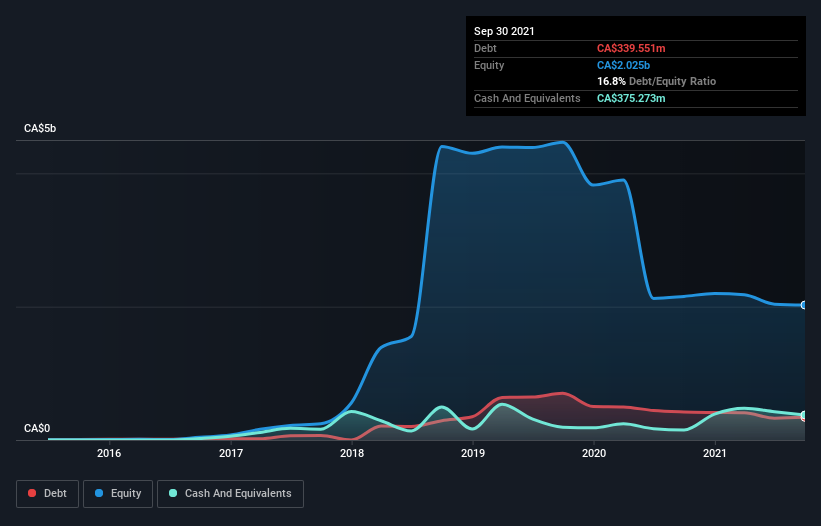Is Aurora Cannabis (TSE:ACB) Weighed On By Its Debt Load?
Some say volatility, rather than debt, is the best way to think about risk as an investor, but Warren Buffett famously said that 'Volatility is far from synonymous with risk.' When we think about how risky a company is, we always like to look at its use of debt, since debt overload can lead to ruin. We note that Aurora Cannabis Inc. (TSE:ACB) does have debt on its balance sheet. But the real question is whether this debt is making the company risky.
When Is Debt Dangerous?
Generally speaking, debt only becomes a real problem when a company can't easily pay it off, either by raising capital or with its own cash flow. Ultimately, if the company can't fulfill its legal obligations to repay debt, shareholders could walk away with nothing. While that is not too common, we often do see indebted companies permanently diluting shareholders because lenders force them to raise capital at a distressed price. By replacing dilution, though, debt can be an extremely good tool for businesses that need capital to invest in growth at high rates of return. The first thing to do when considering how much debt a business uses is to look at its cash and debt together.
See our latest analysis for Aurora Cannabis
What Is Aurora Cannabis's Debt?
You can click the graphic below for the historical numbers, but it shows that Aurora Cannabis had CA$339.6m of debt in September 2021, down from CA$420.4m, one year before. But on the other hand it also has CA$375.3m in cash, leading to a CA$35.7m net cash position.
A Look At Aurora Cannabis' Liabilities
The latest balance sheet data shows that Aurora Cannabis had liabilities of CA$120.4m due within a year, and liabilities of CA$415.0m falling due after that. On the other hand, it had cash of CA$375.3m and CA$54.5m worth of receivables due within a year. So its liabilities outweigh the sum of its cash and (near-term) receivables by CA$105.6m.
Given Aurora Cannabis has a market capitalization of CA$1.38b, it's hard to believe these liabilities pose much threat. However, we do think it is worth keeping an eye on its balance sheet strength, as it may change over time. Despite its noteworthy liabilities, Aurora Cannabis boasts net cash, so it's fair to say it does not have a heavy debt load! The balance sheet is clearly the area to focus on when you are analysing debt. But ultimately the future profitability of the business will decide if Aurora Cannabis can strengthen its balance sheet over time. So if you're focused on the future you can check out this free report showing analyst profit forecasts.
Over 12 months, Aurora Cannabis made a loss at the EBIT level, and saw its revenue drop to CA$238m, which is a fall of 9.5%. We would much prefer see growth.
So How Risky Is Aurora Cannabis?
We have no doubt that loss making companies are, in general, riskier than profitable ones. And the fact is that over the last twelve months Aurora Cannabis lost money at the earnings before interest and tax (EBIT) line. Indeed, in that time it burnt through CA$165m of cash and made a loss of CA$607m. Given it only has net cash of CA$35.7m, the company may need to raise more capital if it doesn't reach break-even soon. Overall, we'd say the stock is a bit risky, and we're usually very cautious until we see positive free cash flow. There's no doubt that we learn most about debt from the balance sheet. But ultimately, every company can contain risks that exist outside of the balance sheet. Case in point: We've spotted 3 warning signs for Aurora Cannabis you should be aware of.
If, after all that, you're more interested in a fast growing company with a rock-solid balance sheet, then check out our list of net cash growth stocks without delay.
Have feedback on this article? Concerned about the content? Get in touch with us directly. Alternatively, email editorial-team (at) simplywallst.com.
This article by Simply Wall St is general in nature. We provide commentary based on historical data and analyst forecasts only using an unbiased methodology and our articles are not intended to be financial advice. It does not constitute a recommendation to buy or sell any stock, and does not take account of your objectives, or your financial situation. We aim to bring you long-term focused analysis driven by fundamental data. Note that our analysis may not factor in the latest price-sensitive company announcements or qualitative material. Simply Wall St has no position in any stocks mentioned.

